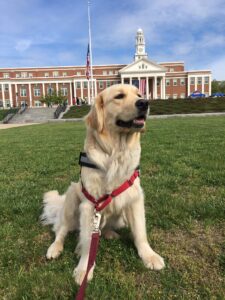By Debbie Spingarn
Contributing Writer

Photo/Submitted
NORWOOD – Tom Smith of Norwood, whose wife Judi required 24-hour, seven-days-a-week home care due to ALS, described his experience finding caregivers who would come into his home as “incredibly difficult.” His wife had a service dog, Harley, a golden retriever trained by GOFI (Golden Opportunities for Independence) of Walpole. Smith said that most agencies would inquire about a dog in the home and asked that the animal be locked up or restrained. However, as Smith explained, as soon as an ALS patient receives a tracheotomy they cannot be left alone. Due to the caregivers’ restrictions with animals, Smith said, “I had to do most of it myself.”
“As you can imagine, I was in a panic,” Smith said. “My wife was on a brand-new device where she needed to breathe, and we were given dire warnings to have the device checked within three days and she (the respiratory therapist) just walked out.” Smith later found a local person who cared for his wife for 18 months. Judi passed away at the young age of 57.
Reluctance to serve homes with dogs
According to executive director Jake Krilovich of the Home Alliance of Massachusetts, a group of 180 home care agencies in the Bay State, most agencies try to screen their home care workers and find workers who are comfortable with dogs. However, this is not always possible and contributes to an even greater shortage of home care workers. An informal poll of about 10 to15 agencies stated that dog bites were frequent and for this and other reasons, workers may refuse to work in a home where dogs are present. Many home care workers are from cultures around the world where dogs are not viewed as family members.
Nancy Capone, 58, also of Norwood, had major spine surgery in early July and found the caregiver assigned to her home was afraid of her three dogs, a mini-Australian Shepherd, Siberian husky and Labrador retriever. “She was requesting never to come back here again,” Capone said. “If a person has a dog, they shouldn’t be ashamed of having it, and having to put it away,” she added. “The dogs had to be locked in a separate room. My blood pressure went through the roof,” Capone added. Though the visiting nurse agency Nancy used was told of her pets, she still encountered a therapist “who was petrified of dogs.”
Training of caregivers crucial
The Massachusetts Dept of Health regulates training certification for home health aides, CNAs (Certified Nursing Assistants) and nursing students. CNAs must have a minimum of 75 hours of training and pass a state exam. Training on understanding the dog’s role as companion and support to the patient is not part of required aide education. Training can be as little as three weeks to as much as 48 weeks. Caregivers entering a home may not be equipped or trained to understand a dog’s behavior, role within the family, or capacity to provide companionship, love and healing to the patient in need.
The MSPCA in Boston offers information on dog bite prevention. This includes ways for families to introduce their dogs to newcomers to the home. The article, provided by Communications and Outreach Manager of the Massachusetts Executive Office of Elder Affair Eleanor Romano, states that “It is never safe to approach a strange dog especially when tied in a yard or behind a fence. Always assume that a dog who doesn’t know you may see you as an intruder or a threat.”
Training programs vary. If you have a dog and are concerned about obtaining home health care, be sure to discuss it with it any home health care agency you are considering. For more information on caregiver training, contact Kayla Rosario-Munoz at the Massachusetts Executive Office of Health and Human Services at 857-248-1104 or Eleanor Romano, Communications and Outreach Manager, at the Massachusetts Executive Office of Elder Affairs at eleanor.romano@state.ma.us.
RELATED CONTENT:
Many adults over sixty serving as caregivers for their very elderly parents (fiftyplusadvocate.com)
Clinical studies offer opportunities for family caregivers (fiftyplusadvocate.com)
Tax credits possible for family caregivers (fiftyplusadvocate.com)












